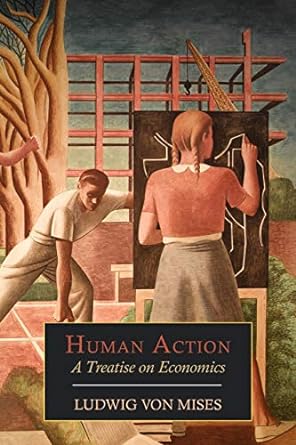In 1949, Harry Truman was sworn in for a second time as president. NATO was established months after the signing of the North Atlantic Treaty. South Pacific premiered on Broadway. Israel joined the United Nations, and the People’s Republic of China was formed. Alger Hiss stood trial in New York, with Whittaker Chambers as a key witness. And Ludwig von Mises published his seminal work Human Action through Yale University Press—a revised English version of his German text Nationalökonomie.
Human Action is Mises’s magnum opus. Essential for understanding free-market principles, it decisively shaped libertarian thought and the conservative movement in America. Its profound philosophical analysis of human behavior offers invaluable insights, even for those who may initially be uninterested in economics.
Human Action is a long work that encapsulates the core principles of the “Austrian School of Economics,” named for the Austrian national background of such prominent exponents as Carl Menger, Eugen von Böhm-Bawerk, Friedrich von Wieser, and Friedrich von Hayek. The book can be considered a treatise on epistemology from which economic conclusions flow. Mises begins, after all, with epistemological questions, examining the nature and limits of knowledge.
This starting point is crucial because it lays the foundation for two key concepts in Austrian economics: (1) praxeology, or the study of human action based on a priori concepts and their logical relationships, rather than historical analysis (as in Marxism, with its account of historical materialism) and (2) methodological individualism, or the proposition that only individuals, not collective groups, act.
These premises are indispensable to understanding the Austrian approach to economics and human behavior. From them, Mises extrapolates ideas aimed at promoting peace and prosperity while minimizing war, violence, and coercion.
I’ll highlight a few. The first is economic calculation.
“The paradox of ‘planning’ is that it cannot plan,” Mises declared, “because of the absence of economic calculation. What is called a planned economy is no economy at all. It is just a system of groping about in the dark.”
For Mises, central planning relies on assuming that a small group of leaders can know enough to intelligently and efficiently allocate society’s scarce resources. Yet reality is unpredictable: even capable business owners and investors can’t precisely forecast consumer or industry demands. They make educated guesses but often err.
The free market is antithetical to central planning. It isn’t perfect, but is merely, in Mises’s words, “the best solution accessible to the human mind under the given state of technological knowledge and the intellectual abilities of the age’s shrewdest men.”
In a free-market system, an entrepreneur willingly pursues various ideas. Some work; some don’t. In the aggregate, the ones that don’t work are competitively eliminated. Meanwhile, prices act as signals, conveying information about demand and scarcity. Rising prices indicate to businesses that they can profitably produce more of a good, whereas falling prices signal to them to produce less.
Embracing this complex process—which is spread across millions of people all using local, tacit knowledge—is more efficient than having one small group try to plan the whole economy. The system, unplanned as it is, channels the dispersed knowledge that no one person or group of people could possess.
Another focus of Human Action is a concept much discussed today: inflation. Mises prefers to speak of the “purchasing power” of money. Why? Because money’s value is always changing, affected by both inflationary and deflationary pressures. People typically use the term “inflation” or “deflation” only when these changes are large enough to be noticeable, but they are always present.
Mises explains that inflation occurs when the quantity of money in circulation increases. He warns that the inflationary process unfolds in stages and can take years, escaping notice until it’s too late. A recent example would be COVID-19 relief funds, which were injected into the economy supposedly to stimulate it while the Federal Reserve lowered interest rates to excite borrowing and spending. Instead of invigorating the economy as intended, these measures caused rising commodity prices. And rather than blaming monetary policy for the resulting inflation, politicians and bureaucrats blamed COVID, which, lacking agency, cannot be held morally responsible for the consequences of political or policy decisions.
Central banks are a primary target of Mises’s criticism because they attempt to solve self-inflicted problems through credit expansion and the disruption of natural trade cycles. By lowering interest rates through credit expansion, they provide only temporary relief, leading to net negative consequences. Central banks, in collaboration with government officials, historically concentrated precious metals like gold or silver in their reserves, creating dependency among private banks. As a result, private banks maintained less cash on hand while nonetheless projecting an appearance of solvency, relying on the central bank for bailouts whenever runs on deposits occurred. Over time, this leads to critical instability throughout the banking system. (Mises championed the gold standard, putting him at odds with economists who favored fiat currency—such as we have today—for easier manipulation of the money supply.)
Mises despised war, which he viewed as antithetical to a market economy. “What the incompatibility of war and capitalism really means,” he wrote, “is that war and high civilization are incompatible.” He advised that we “discard the ideology”—whatever it might be—“that generates war.”
Should conservatives still read Human Action even though Mises wasn’t a self-described or orthodox conservative? Emphatically, yes. Its ideas have the potential to unite diverse factions within the right, notably those exemplified by the contrasting FreeCon and NatCon statements of principles. Their main points of contention revolve around industrial policy, trade, tariffs, and immigration, though the actual statements are less divergent than agitators in either camp may suggest.
Social and religious conservatives should study Human Action because economic freedom is necessary for preserving the family and culture while strengthening community ties.
Economically oriented libertarians often ignore cultural concerns, tolerating libertinism and even showing antipathy towards tradition, religion, and family. On the other side, NatCons tend to claim that libertarian policies have dominated the right for decades, despite the clear contrary evidence of the federal government’s continuous growth. This steady state expansion has resulted in a pervasive managerial welfare leviathan that intervenes in all aspects of daily life.
Most self-identified conservatives occupy a middle ground, acknowledging the importance of both economic growth and good values for societal stability and order. Economic prosperity and moral values are, in fact, interconnected and mutually reinforcing. Conservatives who prioritize social values and morality require a thriving economy to support their goals. Equally, advocates of free-market principles need a society rooted in ethics, justice, and strong social values for their economic objectives to succeed. In essence, a healthy society depends on economic vitality and moral foundations working in tandem.
Perhaps some species of conservatism idealize a way of life based on close-knit, tribal-like communities following strict religious and moral teachings, remaining isolated from mainstream commercial society, prioritizing strong bonds between community members, and cultivating eternal values. Conservatives who follow this outline might believe that prosperity leads to luxury, which invariably results in moral decay, and that poverty, while challenging, preserves moral integrity. This romanticized vision for society holds that living in relative poverty but maintaining high moral standards is preferable to achieving material wealth at the cost of spiritual harm. The reality, however, is that prosperity can coexist with and nourish moral and spiritual health. Actual poverty looks less like a communitarian utopia and more like methamphetamine abuse, fentanyl overdoses, political corruption, bad education, declining health, shortened lifespans, poor housing conditions, and dependence on government programming.
Social and religious conservatives should study Human Action because economic freedom is necessary for preserving the family and culture while strengthening community ties, whereas inflation and economic instability erode moral foundations. (In turn, free-market advocates should promote cultural conservatism to counter state intrusion into family and community affairs. The family acts as a defense against the welfare state, preserving non-state institutions and voluntary private activity.)
Inflation undermines purchasing power and financial stability, increases stress on family and community commitments, raises education costs, widens the wealth gap, reduces intergenerational transfers from parents to children, undermines retirement security and elder care, and encourages career choices based on financial concerns over vocation, promoting materialism over human solidarity and tradition. Social problems like rampant crime are partly attributable to poor economic policies.
Economic instability correlates with higher divorce rates, increased mental health problems and domestic violence, delayed marriage and parenthood, reduced fertility rates in wealthier groups, weakened nuclear family structures, and cohabitation over marriage (due in part to high housing costs). The welfare state exacerbates these issues by undermining the nuclear family, replacing community support with government bureaucracy, politicizing daily life, altering time-tested values and family structures, and incentivizing divorce through state provisions to single parents and other deleterious domestic arrangements.
Human Action is properly part of the conservative tradition, and anyone espousing traditionalism will benefit from carefully analyzing it to appreciate its place in that tradition and relevance for today’s conservatives. Conservatives contemplating Human Action may also delight in Mises’s other works, such as Nation, State, and Economy, which align with conservatism. Examining Mises’s broader oeuvre helps bridge apparent gaps between libertarian and national conservative thought. Mises supported peaceful nationalism based on a people’s right to self-determination and solidarity. He characterized nationalist movements as populist bulwarks against elite rule, a position that led him to oppose European colonialism, seeing it as a brutal obstacle to self-determination. On the other hand, in Human Action he decried “aggressive nationalism,” the “necessary derivative of the politics of interventionism and national planning.”
In Human Action and Nation, State, and Economy, Mises warns that economic nationalism breeds conflict and hinders international cooperation, yet he recognizes the importance of social cohesion in resisting tyrannical government, advocating a form of nationalism that combines economic liberalism with locally embedded culture and nested values.
Economics, in Mises’s view, is a tool of analysis that reveals how humans tend to act in their economic interests; those interests include shared values that promote peace, growth, and prosperity. Like a hammer or a car, economics itself is morally neutral. Its application can serve either moral or immoral purposes depending on human agency: a hammer can build a house or strike a skull, if its user so wills; a vehicle can transport patients to the hospital and families to vacation, or it can be used as a getaway vehicle to escape the scene of a heinous crime.
While he treated economics as value-neutral and apolitical, Mises believed it provided a foundation for social values to thrive. Human Action expounds how economic knowledge is fundamental to modern civilization, underpinning the moral, intellectual, technological, and medical advancements of recent centuries. This knowledge, Mises contends, is a valuable resource at humanity’s disposal, and the choice of whether to use it wisely lies with us.
He concludes Human Action with a stark warning, namely that ignoring economic principles won’t negate their existence or impact. Overlooking them, in fact, could lead to the downfall of society. If we “fail to take the best advantage” of economics and “disregard its teachings and warnings,” he cautions, we will “not annul economics” but eventually “stamp out society and the human race.” These ominous lines underscore Mises’s view of economics as not merely a dense academic discipline but, existentially, necessary for our survival. We ignore it at our peril.















